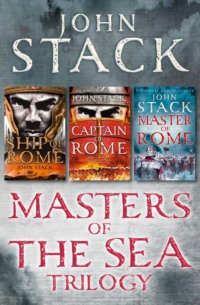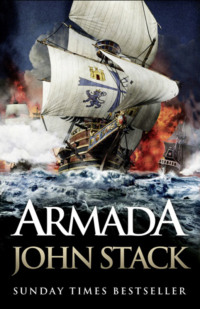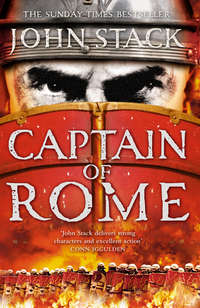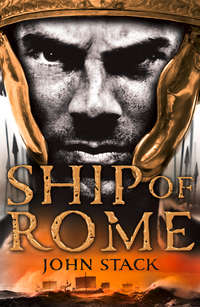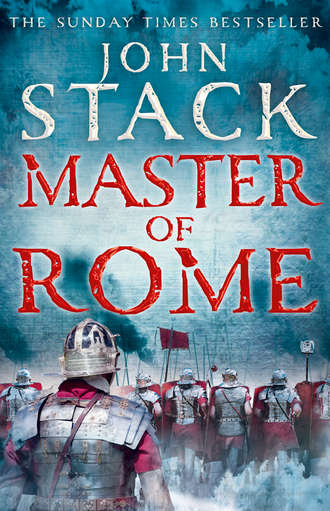
Полная версия
Master of Rome
The Orcus rolled sickeningly and every man was thrown to the deck, Gaius alone standing firm, never relinquishing his grip on the tiller. Sea water crashed over the starboard side, sweeping across the decks, taking two of the crew, and for a second the Orcus was poised to capsize before its buoyancy righted the hull. Atticus clambered to his feet, the deck giving little purchase, and spat at the storm, shouting a string of curses to Poseidon.
‘We have to turn,’ Gaius shouted, his face twisted in effort, the tiller trembling in his hands. ‘The waves are pushing us broadside.’
‘We turn into the wind now and we’re dead men,’ Atticus shouted back. ‘Hold this position. I’m going to rid us of that cursed ramp.’
Atticus turned and grabbed Septimus by the forearm. ‘Come with me,’ he shouted, and they fought their way across the heaving deck, their heads down into the rain-laden wind. Atticus called to Baro and the second-in-command ran to get axes, gathering crewmen as he went; they made their way to the foredeck.
The Orcus rolled violently and again they were thrown off their feet, the deck tilting beneath them. They slid to the portside rail, Atticus slamming into the barrier; the air was blown from his lungs as sea water washed over him. He struggled to breathe. A hand clawed at him and instinctively he reached out to grab it, but it slipped away and a cry of terror was lost in the deafening noise of the storm. He struggled to his feet and looked back to the aft-deck, signalling to Gaius to turn the bow a point further into the wind in a bid to find a balance between the threat of capsizing or foundering.
Atticus made the foredeck with Septimus, Baro and three other crewmen, and immediately they attacked the mounting pole of the corvus with their axes. Their blows were erratic, the pitch and roll of the deck robbing each man of the chance to find a rhythm, their feet slipping on the timbers. They fell in turn, coming to their feet each time with a string of curses.
With every passing second, the wind seemed to increase in intensity and the pitch of the Orcus deepened, her bow slamming into each roller. A wave of sea water erupted over the bow rail to sweep the foredeck, taking one of the crewmen, the sailor screaming as he fell into the water, his arms flailing, reaching out for the galley as he was carried further from the Orcus. Atticus stared at the crewman as he came back to his feet, feeling the weight of the axe in his hand, the haft wet with water, and he tightened his grip until his knuckles ached. He turned to the corvus and roared in anger, striking downwards, a splinter of oak spinning away as four other blades fell in succession.
Another wave crashed over the bow, carrying with it the body of a dead sailor. The corpse slid across the deck until it struck the side rail, but the next wave washed it overboard, the possessive sea claiming the sailor once more. A crack ripped across the base of the mounting pole and the men redoubled their efforts, striking at the point of weakness, the weight of the corvus now working to their advantage as the pole gave way under the strain. It separated without warning and the boarding ramp fell to the deck, the galley heeling over violently under the shift in weight.
‘The guy ropes,’ Atticus shouted, his words unheard in the noise, but every man understood the order and they rushed to sever the lines attached to the mounting pole, each one cut with a single axe blow, the lines whipping away. Baro yelled in pain as a rope struck him on the face, knocking him to the deck, a crewman grabbing hold of him as sea water threatened to wash him over the side.
For a heartbeat the corvus remained defiantly on board but, as the galley rolled, it swept towards the port side and smashed through the side rail before crashing into the sea. The bow of the Orcus soared out of the water, suddenly free of the dead weight, and Atticus yelled at the men around him to hold on as Gaius completed the turn into the wind, bringing the bow around to slice cleanly into the oncoming waves, the cutwater separating each wave from trough to crest.
Atticus led Septimus and Baro back to the aft-deck, the second-in-command covering the side of his face with his opened hand, rain-streaked blood running down his arm. The wind pushed into their backs as they fought the pitch of the deck, their pace changing as the deck fell away or reared up before them.
As they reached the aft-deck, Gaius called Atticus to his side. ‘We can’t make headway,’ he shouted, his voice laced with anger and frustration, and Atticus looked to the four points of his ship, trying to gauge the galley’s progress.
The Orcus was pointed directly into the wind and the waves; the combined forces were driving the galley back towards the shoreline behind. Atticus ran to the side rail to see the oars, watching them intently as the Orcus broke over the crest of a wave. For several seconds the blades of the forward oars were free of the water and the rowers pulled their oars through air, the sudden release of pressure fouling their rhythm, until the galley fell over the crest and accelerated into the trough. The bow crashed below the surface, submerging the lower oar-holes and, as the bow resurfaced, Atticus saw sea water pour from them, knowing it was but a fraction of what the galley had consumed. He ran back to the tiller.
‘Baro,’ he shouted, leaning in, wiping the rain from his face. He outlined his plan, and the second-in-command stumbled away to the aft-rail. Atticus looked to the helm. ‘Gaius, find a reference point on shore. We need to stand fast and ride out the storm in this position.’
The helmsman nodded. Atticus turned to Septimus and signalled to him to follow. They went to the main deck and Atticus ordered two crewmen to remove the aft hatch cover. He jumped down on to the steps the second the cover was away and clambered down, pausing at the bottom. The storm had transformed the rowing deck into a hellish place, the half-light filled with the sounds of wailing and the stench of sea sickness, while the waves hammered against the hull, the timbers groaning with each blow, the deck swooping beneath them with every pitch, the drum beat resounding in the enclosed space.
Drusus had the legionaries arranged along the central walkway that ran the length of the galley, the men crouched against the pitch of the deck, many of them stained with vomit, their faces drained of colour. Atticus ran to the centre of the galley, the sound of muffled screams guiding his feet, and he hauled up the trap door that led to the relief rowers in the lower hold. He looked down and dread struck him like a blow to his stomach. The men there were up to their chests in water, their faces upturned in abject terror; they fought each other to clamber up the ladder on to the walkway.
Septimus had followed Atticus and he called to the legionaries closest to him, the men drawing their swords to control the flood of relief rowers, stemming the threat of panic. Atticus quickly ordered the oars on the lowest level to be shipped and withdrawn, along with all the oars in the fore-section, and he rearranged the men and the relief rowers until there were two on each remaining oar, giving each oar extra strength and control.
Atticus moved to the top of the steps of the open hatchway and signalled Baro to make ready. He took a minute to judge the pace of the oncoming wave before ordering the drum master to make standard speed. The Orcus surged forward with renewed strength and quickly began to make headway, the galley climbing up the slope of the wave. As the Orcus neared the crest, Atticus signalled to Baro to release a drogue, an open water barrel that was lashed to the stern.
The Orcus crested the wave and Atticus called for all stop, the rowers holding their stroke. The drogue slowed the galley’s descent down the reverse slope, her bow biting into the trough but not as deeply as before, and Atticus immediately called for the oars to restart at battle speed, the rowers now fighting both the slope of the next wave and the drogue.
Atticus repeated the pattern a dozen times before he turned to Gaius. The helmsman was looking to a point off the starboard rail but, as he turned and caught Atticus’s eye, he nodded. The Orcus was holding steady, neither advancing nor retreating.
Atticus put his hand up to shield his eyes against the driving wind and rain as he looked to the fore once more. He shouted his next command to the drum master without thinking, the routine already established, and he suddenly became aware of the numbness of his limbs, the bitter cold that had seeped into him as he sat motionless in the open hatchway. He closed his mind to the pain, knowing the storm could last for hours yet, and between commands he looked to the sea around the Orcus.
Atticus could see no more than two miles in any direction, the rain-laden air obscuring all else, but even in that narrow field the scenes of carnage were terrifying to behold. The shoreline had already claimed dozens of ships, the waves breaking over their shattered hulls, relentlessly pounding the galleys against the rocks in unceasing fury while other ships were drawn inexorably closer to their doom, the crews fighting hopelessly against the power of Poseidon, a desperate fight between mortal men and the son of titans.
In the open sea around the Orcus only a handful of galleys were still afloat, all of them sailing into the wind, but as Atticus watched, two more foundered, the corvi on their foredecks dragging their bows beneath the surface, the boarding ramp that had once saved the fleet of Rome now a terrible curse, while all around the sinking galleys the water was strewn with dead and dying men, the wind mercifully hiding their screams from the living.
Atticus looked to the fore once more and the solid wall of blackness that was the heart of the storm. Its strength was unbound, its oblivious butchery far from over, and the numbness Atticus felt in his limbs slowly crept into his heart, shielding him from the agony that was the loss of the Classis Romanus.
CHAPTER FOUR
Gaius Duilius sat motionless as the princeps senatus, the leader of the house, read the prepared statement, the senior senator’s voice faltering with age and the gravity of the words he spoke. The three hundred-strong assembly of senators listened in near silence, with only sporadic exclamations of shock stirring the still air of the Curia Hostilia, the Senate house of Rome.
The galley dispatched by Paullus from Agrigentum over a week ago had arrived in Ostia twelve hours before, bearing the report that the vast majority of senators in the Curia were now only hearing for the first time; a report that outlined the destruction of the expeditionary army in a battle outside Tunis, and Paullus’s resultant decision to sail to Africa. Duilius paid only scant attention to the leader’s words, his attention instead focused on the reactions of others in the chamber. He had been aware of the full contents of the report within two hours of the galley’s arrival, his network of spies and informants as always keeping him fully informed, and so now he was free to scan the faces of his fellow senators, specifically those amongst the ranks of his opponents
Duilius’s task was made easier by the invisible yet explicit divide that existed in the Senate. On his side of the chamber, he was surrounded by men who daily challenged the established order of Rome, progressive senators, many of whom were novi homines, new men, the first of their family to be elected to the Senate. The other side of the chamber was dominated by members of the senior patrician families of the city, descendants of the men who had founded the Republic and whose strength depended on the status quo being maintained.
Duilius studied the expression of each man surreptitiously, discounting many out of hand, knowing them to be insignificant pawns or sycophants. Equally he disregarded those he knew for certain were within the inner coterie of the opposition, senior senators who were no doubt cognisant of the full details of the report but had the presence of mind to look surprised and alarmed. Instead Duilius focused on the remainder, searching for telltale signs of awareness, subtle indications of composure that would reveal their foreknowledge of the report and therefore their inclusion in the inner circle. He knew from experience that often the newest members of any coterie, many of them young senators, lacked the political sense to bury their awareness behind impassive expressions, and so this was a rare opportunity to advance his knowledge of the opposition’s ranks.
Despite recognizing the brevity of his opportunity, Duilius froze as his gaze settled on one of the senators, Gnaeus Cornelius Scipio. He was an austere-looking man and his head was bowed slightly, as if to partially hide his expression, although Duilius knew that posture was unnecessary. Scipio was a skilled pretender and his self-discipline was matched only by his ruthlessness. He was the leader of the opposition, although few knew him as such, including those who were his closest allies, as Scipio’s greatest talent lay in his ability to manipulate events sub rosa. For that reason alone, Duilius knew him to be his worthiest and most dangerous adversary.
Duilius had learned a great deal from Scipio over the years since they had shared the consulship. That tenure had ended in ignominy for Scipio, his defeat and capture at Lipara earning him the cognomen Asina: ‘donkey’. Yet he had survived politically, wielding his power behind the scenes, and already his machinations had led to the election of two senior consuls, Regulus and, in turn, Paullus. Duilius had fully adopted Scipio’s approach, disguising the significant power he held during his tenure as censor to influence voting in the Senate, and the hatred and rivalry between the two men had deepened with every confrontation.
As if realizing he was being studied, Scipio glanced in Duilius’s direction and their eyes met. He smiled coldly, a gesture that Duilius returned. Regulus’s defeat in Africa would have repercussions, the balance of power in the Senate would be affected and careers could be advanced or impeded depending on how the aftermath was controlled. Neither Duilius nor Scipio were openly recognized as the leaders of the two factions fighting for supremacy in the Roman Senate, but with that one brief exchange across the crowded chamber, the two men had signalled the escalation of hostilities.
Hamilcar hesitated in the quiet of the entrance to the temple, the complete silence and his apparent solitude unsettling him. The afternoon sun was warm upon his back, raising drops of sweat at the base of his neck that ran down inside his tunic. The light framed his shadow as it reached into the interior of the vaulted inner chamber. He took a step forward and stopped again, hindered by a growing sense of unworthiness, a feeling that his gratitude would somehow sully the incredible feat accomplished by the deity that dwelt within the hallowed space before him.
The first rumours had arrived in Carthage the day before, the news sweeping the streets like a wildfire borne on the mighty ghibli. Hamilcar had immediately rushed to the port, anxious for more news from arriving ships, for confirmation that such a miracle had indeed occurred; but for the following twenty-four hours he was frustrated with further unsubstantiated rumours. Only that morning had a military galley arrived from Selinus and its captain had confirmed the report, prompting Hamilcar’s flight to the temple of Yam.
Hamilcar stepped forward once more, moving through the unadorned porch and into the inner room, his gaze slowly sweeping over the engravings on the granite walls representing the untamed sea, the depictions sending a shiver of unearthly fear through his stomach. The statue of Yam was at the far end of the chamber. The shadows played across its form and Hamilcar held his breath as he looked upon it. In the war against the Romans, he had often called on the support of many of the gods, calling down their favour or the power of their wrath, but never before had he prayed to this minor deity, the overlord of violent tempests and the raging sea.
Hamilcar fell forward as if struck from behind, and the temple echoed with the crashing sound of his body hitting the floor. He spread out his arms and prostrated himself, pressing his forehead on to the marble slab as he began to whisper his thanks. The prayers came slowly at first, his humility robbing him of the words, but soon the strength of his gratitude overwhelmed him and he spoke without pausing for breath, humbling himself unashamedly in the quiet of the inner temple.
After a time, Hamilcar became silent. He raised himself up and looked to the statue once more, wanting to remember every detail. Nodding, he turned to leave; as he left the inner chamber he saw a number of other people approaching, many of them carrying garlands and amphorae of wine, offerings for the previously ignored god. In time, as the news of the destruction of the Roman fleet spread, the temple would become inundated with grateful worshippers. Hamilcar was glad he had been given this time alone to express his gratitude.
He quickened his step as he made his way through the oncoming crowd, eager to return to the city and continue the development of his plan, born of the idea that had formed in his mind when he heard the first rumours of the storm. Soon he would sail for Sicily, but first he needed to plant the seed of his plan to take maximum advantage of the Roman fleet’s destruction. The last of Hamilcar’s doubts fell away as he walked towards the city. It was time to go on the attack, and with the gods on the side of Carthage, there was none who could stand against him.
Atticus stood with his face up to the sun, his eyes closed against the glare as he felt the heat infuse his body. The overlapping sounds of carpenters’ tools filled the air, and Atticus’s memory was stirred by the noise, his mind drifting back to that day in Aspis before the fleet sailed to Sicily, and the awe he had felt as he gazed at the assembled fleet. The thought made him open his eyes and he looked out over the eighty galleys anchored in the harbour of Agrigentum.
Many of the ships were listing badly, their hulls still partially flooded. Atticus noticed that some of the crews were using the new screw pump to drain the bilges, a curious-looking device recently invented by a young Syracusan. Of the remaining galleys, every one of them showed signs of storm damage, from splintered oars to severed mainmasts, and Atticus counted a half-dozen ships in the waters immediately surrounding the Orcus that would never be seaworthy again.
He moved to the side of the deck and rubbed his hand across the rail, his fingers finding and tracing the outline of a crack in the weathered pine. Eighty galleys saved. Over three hundred lost, amongst them the Concordia. Atticus scowled darkly as he observed that the majority of the surviving ships were Carthaginian galleys captured at Cape Hermaeum, the absence of a corvus giving them a vital advantage during those first chaotic minutes when the squall line overtook the fleet.
The storm had lasted for four long hours and, by the time it had finally ended, the sea had claimed close to a hundred thousand men. It was a staggering figure, and Atticus could not grasp the amount, a figure twenty times the population of his home city of Locri.
‘We’re ready to sail, Prefect,’ Baro said, and Atticus turned and nodded his assent, his eye drawn to the open welt on Baro’s face. As the second-in-command turned away, Atticus unconsciously fingered the scar on his jaw line, tracing the old wound as he had the crack on the side rail of the Orcus. His hand fell away as he saw Septimus approach.
‘We’re ready to go,’ Atticus said.
The centurion nodded. ‘Homeward bound,’ he said, savouring the words, although there was little joy in his voice. ‘How long will it take?’
‘We have to take the long way around, past Syracuse,’ Atticus said. ‘A little over a week if the weather holds.’
‘If the weather holds?’ Septimus said icily. ‘Surely the cursed gods have already taken enough?’
Atticus nodded, sharing his friend’s anger at Poseidon’s feckless slaughter, although his anger also ran deeply for another reason.
Gaius called for steerage speed and the Orcus got under way, her bow turning slowly in the inner harbour. Atticus glanced over the aft-rail to the temples overlooking the city. They were magnificent to behold, built when the city was under Greek control nearly two hundred years before, and he looked to each in turn, the temples of Zeus and Hercules, the ruins of the temple of Juno, burned by the Carthaginians when they sacked the city, and finally the temple of Concordia, the goddess of harmony.
Atticus stared at the last temple for a moment and then looked away in contempt. The storm had wiped out the Classis Romanus, but Atticus knew their fate had been sealed days before when Paullus had arrogantly dismissed his warnings. The Romans were a proud people. In some that pride had developed into a deep sense of honour – Atticus instinctively glanced at Septimus – but in others it had festered to become a deep-rooted conceit that fed their arrogance. It was this trait that Atticus had come to loathe, one he had encountered too many times in the men who commanded him.
The shout went up for standard speed as the Orcus cleared the lines of anchored ships and the galley sped towards the mouth of the harbour, the swell increasing as the protective headlands gave way to the open sea. Atticus looked to the four points of his ship, the sky clear on all horizons, and he ordered the course change, committing Orcus to the journey.
Ahead to the southeast lay the coast of Syracuse, and beyond, to the north, the Straits of Messina. Once clear of the channel they would sail with Italy on their flank and their destination dead ahead, a city built on the pride that defined its people and ruled by men who had chosen one or other of the roads from led from that virtue. Given the grave news that the Orcus was carrying, of the destruction of the fleet, Atticus knew, as the senior surviving officer, he would have to stand before the leaders of the Republic. With Regulus in Carthaginian hands and Paullus in Pluto’s, he could not know who awaited him in Rome.
Scipio remained seated as the debate ended, and for a moment his view was obscured by the senators around him as they stood up and moved to the floor. They began to congregate in small groups, the junior members gravitating around the senior, nodding sagaciously as their mentors made obvious points regarding the loss of the army in Africa. Scipio leaned forward and watched Duilius leave the chamber alone, noting his rival’s purposeful stride, the inherent determination and independence that set him apart from the verbose, inconsequential men of the Senate.
Scipio respected that characteristic in his opponent, for it was one he believed was central to his own survival and success; looking out over the floor of the Senate, he silently mocked the lesser men in the chamber, men who grouped together for mutual sponsorship and confidence. Scipio had long ago realized that the Roman Senate was essentially an assembly of individuals. There were no permanent party lines, and even the current factions would be transitory at best, alliances of convenience forged by members of the Senate to serve their own needs.
Scipio had no allies, only confederates, temporary accomplices he used to achieve his own personal agenda – and therein lay the true test of his ability to deceive. These men were never his equal, but if handled incorrectly former accomplices could become enemies, their hostility unleashed at the discovery that they had been used as the means for another’s end. Regulus was one such man, a senator Scipio had raised from obscurity to senior consul, but in a moment of unguarded fury he had revealed his motives and Regulus had defied him.
On the day Scipio vowed to avenge Regulus’s betrayal, he also swore to learn from his mistake, and his subsequent control of Paullus’s nomination and election had been meticulous, the senior consul never realizing the true identity of his patron. Scipio’s plan had been simple: to topple Regulus, remove him from command of the expeditionary army and replaced him with Paullus, but the proconsul enjoyed significant support in the Senate, his victory at Ecnomus trumpeted at every opportunity by his former junior consul, Longus, a pawn of Duilius. So Scipio’s efforts in Rome had been thwarted.


